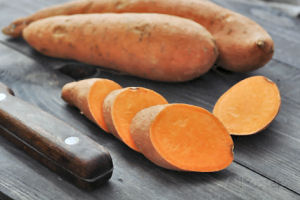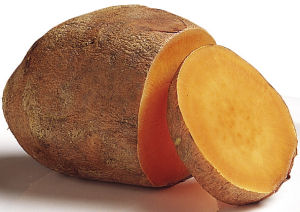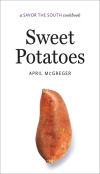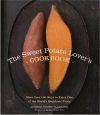
HOME
INTRO
SYMBOLS
ALMANAC
ECONOMY
GEOGRAPHY
STATE MAPS
PEOPLE
FORUM
NEWS
COOL SCHOOLS
STATE QUIZ
STATE LINKS
BOOK STORE
MARKETPLACE
GUESTBOOK
CONTACT US


You may double left-click on a word on this page to retrieve its definition. Tweet Follow
North Carolina State Vegetable

North Carolina State Vegetable: Sweet Potato
Orange flesh sweet potato photograph
Wilson, North Carolina lies about fifty miles west of Raleigh. The city of Wilson (2012 population 49,610) sits in the center of farmland that supports the state's sweet potato industry. North Carolina is the largest producer of sweet potatoes in the United states raising from forty to fifty percent of the nation's total store.
Fourth grade students, from Elvie Street Elementary School *, in Wilson, and their teacher, Celia Batchelor, spent two years working to elevate the sweet potato to an official status equal to that of the official state bird, the official state tree and the official state tartan.
The effort was met with heated opposition. Decried as a waste of time and tax-payer money, state senators managed to block the House introduced legislation repeatedly.
Fourth grade teacher Celia Batchelor, a Wilson native, suggests that the idea for a state vegetable idea "had been rolling around the school and the town of Wilson for some time" {1] when North Carolina State Representative Gene Arnold (Rocky Mount) visited her fourth grade classroom in 1993 as part of her student's civics curriculum. He left the students inspired.
This inspiration led to the initiation a campaign to designate the sweet potato North Carolina's official state vegetable accompanied by letters to legislators to promote the idea.

North Carolina State Vegetable: Sweet Potato
Unfortunately, the student campaign failed to inspire legislators and the legislation that would be needed to promote the sweet potato to official status in North Carolina.
In 1994, a new group of fourth graders filed into Celia Batchelor's classroom at Elvie Street Elementary School in Wilson. When Representative Gene Reynolds was introduced to these new faces, he was reminded of a promise he had made to the previous class. They "not-so-gently reminded him, 'Mr. Arnold, you told Ms. Batchelor’s class last year you were going to introduce a bill about the sweet potatoes.'”1]
Rep. Reynolds took the not-so-subtle hint and, on March 9, 1995, House Bill No. 406 was introduced to the North Carolina General Assembly and referred to the House Committee on Rules, Calendar, and Operations where it was read for the first time, two months later, on May 4, 1995. The members of the Committee on Rules, Calendar, and Operations then re-referred the bill to the House Committee on Agriculture for further action.
GENERAL ASSEMBLY OF NORTH CAROLINA
SESSION 1995
H
1
HOUSE BILL 406
Short Title: Sweet Potato As State Vegetable.
(Public)
Sponsors: Representatives Arnold; Buchanan, Capps, Hurley, and Luebke.
Referred to: Rules, Calendar and Operations of the House.
March 9, 1995
A BILL TO BE ENTITLED AN ACT TO ADOPT THE SWEET POTATO AS THE OFFICIAL STATE VEGETABLE.
The General Assembly of North Carolina enacts: Section 1. Chapter 145 of the General Statutes is amended by adding a new section to read:
"§ 145-17. State vegetable. The sweet potato is adopted as the official vegetable of the State of North Carolina."
Sec. 2. This act is effective upon ratification.
In a setback for the students, House Bill No. 406 languished in the Agriculture Committee and missed the May 11 deadline for full House approval. The bill was considered dead for the 1995-1996 session of the North Carolina General Assembly.
The Elvie Street Elementary School students, nicknamed the Tater Tots, did not take this bit of news as defeat but rather as a spark that would cause them to increase their efforts with more intense pressure on their representatives in the House.
Though an important legislative deadline had been missed, they continued to lobby for their proposal, sending letters and faxes off to House Speaker Harold Brubaker. Their extra efforts met with some success. Though House Bill No. 406 remained inactive, it's proposal was amended to a Senate approved bill in the possession of the House Committee on Agriculture for consideration.
Senate Bill No. 649 was originally crafted and approved in the State Senate to address sweet potato assessments and taxation. The inclusion of the official state vegetable section in Senate Bill No. 649 was approved by the House Committee on Agriculture on May 23, 1995.
Rep. Reynolds and his state vegetable continued to meet with resistance in the House however. When presented to the full House of Representatives for a vote, he was derided as the "Sweet Potato King" and found a gift of forty pounds of sweet potatoes on his desk, courtesy of colleague Rep. Connie Wilson.
“I truly didn’t think about all the grief I’d be catching,” said Arnold, who was being ribbed by his colleagues Thursday. He said he filed the bill, one of only 10 he is allowed to file under House rules, to make good on a promise he made to a fourth-grade class at a Wilson elementary school last year.
("Sweet potato offered as state vegetable", 1995)
Some newspapers decried the students' efforts. The Wilson Daily Times condemned the students' efforts as a waste of the government’s time and money.
“Never mind that having 10-year-olds dictate statewide legislation makes no sense,” The Times wrote in 1995. “Bills declaring state vegetables, drinks, fabrics, rocks, rodents, fungi or soil types should be banned from the Legislative Building on principal as a matter of respect for the taxpayers who are paying $55,000 a day to keep the legislature in session. If even one day of debate went into this legislation — and that may be a low estimate — the taxpayer has been robbed.”
(North Carolina’s Sweet Potato Queen, 2012)
The Tater Tots persisted however with Rep. Reynolds making good on his promise to see their efforts rewarded. The Tater Tots contacted fourth graders from around the state to gather support. An elementary school in Raleigh proved particularly supportive of the sweet potato mission and their enthusiastic participation might have been the turning point in the mission.
In arguing for the bill’s approval, Arnold read from one of the letters sent to Brubaker. “Please say it is a good bill,” fourth-grader Shawn Griffin wrote Brubaker. “.. . You are the only one who can do it.” Griffin promised that fourth-graders across the state would lobby for the bill “from now until doomsday. We’re never going to quit, never. We will nag you to death.”
(North Carolina’s Sweet Potato Queen, 2012)
On May 31, 1995, a substitute Senate Bill No. 649 was approved by a unanimous vote of the North Carolina House of Representatives. Elvie Street Elementary School's proposal for an official state vegetable had be resurrected saved for the time being.
However, because the approved Senate bill was changed in the House of Representatives, the substitute Senate Bill No. 649 had to be returned to the Senate for their approval, This was far from a sure thing.
Adding to the fray were cries of "no fair" from farmers around the state who made their living from other crops, Rutabaga growers from Fayetteville were particularly vocal.
Indeed, the Senate did not agree to the changes made by the House and the state vegetable proposal was put aside again.
When legislation that has, for the most part, met the approval of each chamber of the legislature in one form or another, a joint conference committee is formed. The conference committee attempts to bring the opposing sides together to make the legislation acceptable to both chambers. Such a committee was formed on July 12, 1995.
On July 28, the joint conference committee issued their report, maintaining support for the proposal to make the sweet potato the official vegetable of the State of North Carolina. Evidently, the Senate decided to go along with the House substitute.
GENERAL ASSEMBLY OF NORTH CAROLINA
1995 SESSIONCHAPTER 521
SENATE BILL 649AN ACT CONCERNING SWEET POTATOES.
The General Assembly of North Carolina enacts:
Section 1. G.S. 106-550 reads as rewritten:
"§ 106-550. Policy as to promotion of use of, and markets for, farm products.
It is declared to be in the interest of the public welfare that the North Carolina farmers who are producers of livestock, poultry, field crops and other agricultural products, including cattle, sheep, broilers, turkeys, commercial eggs, peanuts, cotton, potatoes, sweet potatoes, peaches, apples, berries, vegetables and other fruits of all kinds, as well as bulbs and flowers and other agricultural products having a domestic or foreign market, shall be permitted and encouraged to act jointly and in cooperation with growers, handlers, dealers and processors of such products in promoting and stimulating, by advertising and other methods, the increased production, use and sale, domestic and foreign, of any and all of such agricultural commodities. The provisions of this Article, however, shall not include the agricultural products of tobacco, strawberries, strawberry plants, or porcine animals, with respect to which separate provisions have been made."
Sec. 2. Article 50 of Chapter 106 of the General Statutes is amended by adding a new section to read:
"§ 106-564.4. Alternative method for collection of assessments relating to sweet potatoes.
(a) In the event the producers of sweet potatoes approve an assessment pursuant to G.S. 106-564, which assessment shall be paid by the producer based on the number of acres produced, the producer shall report the number of acres planted and shall remit the assessment due to the Commissioner of Agriculture. Sweet potato producers shall report acreage planted at a time and place determined by the duly certified agency representing the producers of sweet potatoes.
(b) Assessments shall be due on September 1 of each year. Any producer who fails to pay assessments by September 30 of each year shall also pay a penalty often percent (10%) of the unpaid assessment, plus a penalty of one percent (1%) of the unpaid assessment for each month the assessment remains unpaid. The Commissioner of Agriculture shall remit all assessments received to the duly certified agency representing the producers of sweet potatoes. The duly certified agency representing the producers of sweet potatoes may conduct inspections and audits of sweet potato producers in order to verify the number of acres of sweet potatoes planted and may Page 2 S.L. 1995-521 Senate Bill 649 bring an action to recover unpaid assessments and penalties and the reasonable costs of such action, including attorneys' fees.
(c) There shall be no refund of assessments collected pursuant to this section.
(d) For the purposes of this section, 'producer' shall be defined as a grower of one acre or more of sweet potatoes."
Sec. 3. Chapter 145 of the General Statutes is amended by adding the following section to read:
"§ 145-17. State vegetable.
Sec. 4. This act is effective upon ratification. Sections 1 and 2 apply to sweet potatoes harvested on or after January 1, 1995.
The sweet potato is adopted as the official vegetable of the State of North Carolina."
In the General Assembly read three times and ratified this the 29th day of July, 1995.
Dennis A. Wicker
President of the SenateHarold J. Brubaker
Speaker of the House of Representatives
Both the Senate and the House approved the report on July 28, 1995.
Senate Bill No. 649 was ratified on July 31, 1995 designating the sweet potato the official state vegetable of North Carolina.
By granting the sweet potato official state vegetable status, lawmakers did more than elevate an overlooked, subterranean vegetable. They showed several dozen kids from some of Wilson’s poorer neighborhoods that it doesn’t always take lobbyists, lawyers, and money to make things happen. You don’t always need a three-piece suit to get a legislator’s attention.
(North Carolina’s Sweet Potato Queen, 2012)
* It looks to us like the Elvie Street Elementary School, in Wilson, is now the Daniels Learning Center.
What's the difference between a sweet potato and a yam?
We think it's important to offer a brief discussion here to differentiate sweet potatoes from yams because, as a marketing endeavor, sweet potatoes have been described as and are often called yams in Louisiana.
When the orange-fleshed, Puerto Rican variety of sweet potatoes was adopted by Louisiana producers and shippers, they were called "yams" to distinguish them from the white-fleshed sweet potatoes grown in other parts of the country. The yam reference became the trademark for Louisiana-grown sweet potatoes.
(Ehler, "Sweet Potato Trivia & Facts")
In fact, sweet potatoes are not related to yams. Sweet potatoes and yams are classified in two different botanical families; Convolvulaceae and Dioscoreaceae respectively. Yams are related to grasses and lilies while sweet potatoes are related to morning glories.
Yams are native to Asia and Africa. Sweet potatoes are native to tropical locations in the Americas.
The skin of a yam, which varies in color from dark brown to light pink, is rough and difficult to cut. The meat, or flesh, ranges in color from white or yellow to purple or pink in more mature yams.
The skin of sweet potato is smooth and can be colored yellow, orange, red, brown, purple, or beige. The meat, or flesh, of sweet potatoes is also variable ranging in color from beige through white, red, pink, violet, yellow, orange, and purple.
Louisiana has also selected the sweet potato as its official state vegetable.

North Carolina Law
The following information was excerpted from the North Carolina General Statutes, Chapter 145, Section 145-17.
Chapter 145: State Symbols and Other Official Adoptions.
G.S. 145-17
§ 145-17. State vegetable.
The sweet potato is adopted as the official vegetable of the State of North Carolina. (1995, c. 521, s. 3.)
Sources...
Ehler, James T. "Sweet Potato Trivia & Facts." Food Reference.com. Chef James T. Ehler, n.d. Web. 21 Oct. 2016.
"Lobbying by Fourth-graders Brings Back Sweet Potato Bill." The Times-News [Burlington] 31 May 1995, sec. C: 5. The Times-News. NewspaperArchive.com. Web. 29 Oct. 2016.
"Senate Nixes Sweet Potato as State Vegetable." The Times-News [Burlington] 13 July 1995, sec. C: 4. The Times-News. NewspaperArchive.com. Web. 29 Oct. 2016.
[1] Shaffer, Josh. "North Carolina’s Sweet Potato Queen." OurState.com. OurState.com, 30 Oct. 2012. Web. 29 Oct. 2016.
"Sweet Potato Offered as State Vegetable." The Times-News [Burlington] 10 Mar. 1995, sec. B: 4. The Times-News. NewspaperArchive.com. Web. 29 Oct. 2016.
Additional Information
Vegetable: Sweet Potato: NCpedia, coordinated and managed by the North Carolina Government & Heritage Library at the State Library of North Carolina, a part of the North Carolina Department of Natural and Cultural Resources..
Sweet Potato: Sweet potato description from the Food Network's Food Encyclopedia.
What is the difference between sweet potatoes and yams?: Everyday Mysteries: Fun Science Facts from the Library of Congress.
Sweet Potato Trivia & Facts: Chef James T. Ehler's Food Reference.com.
Sweet Potato Growing Guide: From the Southern Exposure Seed Exchange.
32 Delicious New Ways to Prepare Sweet Ppotatoes: From Country Living magazine.
Sweet Potato Recipes: From AllRecipes.com.
Sweet Potato Recipes: from the Food Network.
Crop Profile for Sweetpotatoes in North Carolina :
Prepared: February 1999, Revised: November 1999, June 2005 by Jonathan R. Schultheis, Kenneth A. Sorensen, David W. Monks, Gerald J. Holmes, Allan C. Thornton, and Stephen J. Toth, Jr. (ed.), North Carolina State University and North Carolina A&T State University Cooperative Extension.
:
Prepared: February 1999, Revised: November 1999, June 2005 by Jonathan R. Schultheis, Kenneth A. Sorensen, David W. Monks, Gerald J. Holmes, Allan C. Thornton, and Stephen J. Toth, Jr. (ed.), North Carolina State University and North Carolina A&T State University Cooperative Extension.
NC in Focus: Sweet Potatoes: University of North Carolina, Chapel Hill: Carolina Population Center: Carolina Demography.
North Carolina Sweet Potato Commission
Sweet Potatoes: North Carolina Department of Agriculture & Consumer Services: Marketing Division, Horticultural Commodities, Sweet Potatoes.
State vegetables: Complete list of official state vegetables from NETSTATE.COM.
More symbols & emblems: Complete list of official Louisiana state symbols from NETSTATE.COM.

Sweet Potatoes
April McGreger
Sweet Potatoes, by April McGreger. 152 pages. Publisher: The University of North Carolina Press; 1st Edition (September 15, 2014)
In this paean to the brightly colored root, April McGreger tells the multifaceted history of a fundamental southern food, praising its rich and diverse savory-to-sweet flavor profile, botanical varieties, and shockingly high nutritional value. Along with instructions for selection and storage, McGreger shares the fifty best sweet potato recipes in the world. Embracing but going well beyond the classics--from Sweet Potato Pone and Candied Sweet Ppotatoes to Sweet Potato Chiles Rellenos and Sweet Potato-Ginger Crèmes Caramels--McGreger's creations will delight and satisfy with their deliciousness and versatility.
McGreger relates a tale from a traveler in 1940s Mississippi who said he ate "sweet potatoes with wild turkeys and various other meats, had a potato pie for dessert and roasted potatoes offered to him as a side dish, drank sweet potato coffee and sweet potato home brew, had his horse fed on sweet potatoes and sweet potato vines, and when he retired he slept on a mattress stuffed with sweet potato vines and dreamed he was a sweet potato someone was digging up." The sweet potato is no less important to McGreger, the daughter and sister of Mississippi sweet potato farmers.

The Sweet Potato
Lover's Cookbook
Lyniece North Talmadge
The Sweet Potato Lover's Cookbook: More than 100 ways to enjoy one of the world's healthiest foods, by Lyniece North Talmadge. 240 pages. Publisher: Cumberland House; 2nd Edition (November 1, 2010)
Enjoy sweet potatoes year-round with recipes for appetizers, soups, main courses, side dishes, and even breakfasts and desserts!
As every sweet potato lover knows, it's more than just a holiday side dish-it's one of the world's healthiest and most flavorful foods! In this unique collection bursting with over one hundred recipes, you'll find easy-to-make dishes that highlight the natural and delicious flavors of this versatile vegetable.
- Orange Butter Sweet Potato Waffles
- Andouille Sausage and Sweet Potato Soup
- Sweet Potato Dumplings
- Spiced Sweet Potato Chips
- Candied Sweet Ppotatoes
- Easy Caramel Sweet Potato Pie
- And more!
The Omnivore's Dilemma: A Natural History of Four Meals, by Michael Pollan. 464 pages. Penguin Press HC, The (April 11, 2006) The bestselling author of The Botany of Desire explores the ecology of eating to unveil why we consume what we consume in the twenty-first century
In Defense of Food: An Eater's Manifesto, by Michael Pollan. 256 pages. Penguin Press HC, The (2008) In looking toward traditional diets the world over, as well as the foods our families-and regions-historically enjoyed, we can recover a more balanced, reasonable, and pleasurable approach to food. Michael Pollan's bracing and eloquent manifesto shows us how we might start making thoughtful food choices that will enrich our lives and enlarge our sense of what it means to be healthy.

